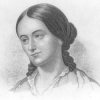Margaret Fuller

Margaret Fuller
Sarah Margaret Fuller Ossoli, commonly known as Margaret Fuller, was an American journalist, critic, and women's rights advocate associated with the American transcendentalism movement. She was the first full-time American female book reviewer in journalism. Her book Woman in the Nineteenth Century is considered the first major feminist work in the United States...
NationalityAmerican
ProfessionActivist
Date of Birth23 May 1810
CityCambridge, MA
CountryUnited States of America
It does not follow because many books are written by persons born in America that there exists an American literature. Books which imitate or represent the thoughts and life of Europe do not constitute an American literature. Before such can exist, an original idea must animate this nation and fresh currents of life must call into life fresh thoughts along the shore.
No temple can still the personal griefs and strifes in the breasts of its visitors.
The mind is not, I know, a highway, but a temple, and its doors should not be carelessly left open.
Our desires, once realized, haunt us again less readily.
All great expression, which on a superficial survey seems so easy as well as so simple, furnishes after a while, to the faithful observer, its own standard by which to appreciate it.
Amid all your duties, keep some hours to yourself.
To one who has enjoyed the full life of any scene, of any hour, what thoughts can be recorded about it seem like the commas and semicolons in the paragraph-mere stops.
The use of criticism, in periodical writing, is to sift, not to stamp a work.
Let no one dare to call another mad who is not himself willing to rank in the same class for every perversion and fault of judgment. Let no one dare aid in punishing another as criminal who is not willing to suffer the penalty due to his own offenses.
Man can never come up to his ideal standard. It is the nature of the immortal spirit to raise that standard higher and higher as it goes from strength to strength, still upward and onward. The wisest and greatest men are ever the most modest.
Beware the mediocrity that threatens middle age, its limitation of thought and interest, its dullness of fancy, its too external life, and mental thinness.
As to marriage, I think the intercourse of heart and mind may be fully enjoyed without entering into this partnership of daily life.
I know of no inquiry which the impulses of man suggests that is forbidden to the resolution of man to pursue.
It was not meant that the soul should cultivate the earth, but that the earth should educate and maintain the soul.